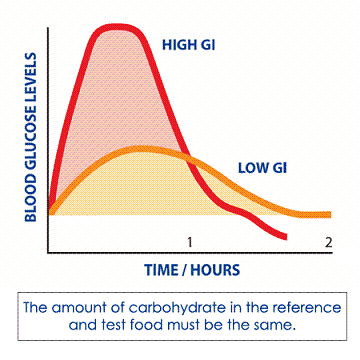Cross Country Nutrition
Cross country can be a grueling sport, and what you eat can make a huge difference in your performance during the season. Much of the information on this page comes from the book Sports Nutrition For Endurance Athletes by Monique Ryan. It may take some experimenting to determine what foods work best for you, but make sure you know what foods work for you before our big Saturday meets.
GI Numbers
The energy you burn during running comes from three sources: carbohydrates (carbs), protein, and fat. Each source is broken down into simple sugars when you run to give you energy. Food is your primary source of carbs, protein, and fat. Carbs can be converted to simple sugars much quicker than protein and fat so they are the best option for pre-race meals and snacks. In addition, fat takes much more oxygen to convert to sugar so it is not a very good option for runners since that oxygen will be a valuable resource during a race.

While carbs are your best option for pre-race fueling, some carbs are better than others. Food can be ranked by its Glycemic Index, which is the ability to convert food to sugar. Low- to moderate-glycemic food converts slowly over several hours and can be helpful for a meal long before a race.
High-glycemic foods can produce a rapid rise in blood sugar and can be helpful just before a race.
Some example foods with their GI numbers are listed to the left. You can look up the GI number of any food by going to glycemicindex.com.
Remember, a high GI number means the food is closer to sugar, which means you will get energy quickly. A lower GI number means the energy will be distributed over several hours.
Keep in mind that a high GI number is not always a good thing. That quick energy may not last long so a high-GI snack before a race in best when paired with a low-GI meal much earlier.
For a single day your diet should consist of the following:
| Calories (per lb. of weight) |
Carbs (per lb. of weight) |
Protein (per lb. of weight) |
Fat (per lb. of weight) |
| 15-17 calories | 3-4.5 grams | 0.5-0.75 grams | 0.5 grams |
For a 100-pound runner that would mean consuming between 1500 and 1700 calories, 300 and 450 grams of carbs, 50 and 75 grams of protein and 50 grams of fat in a single day.
Hydrating
To stay properly hydrated you should have a goal of drinking 8 - 10 ounces of water every hour. A drinking fountain can give you this much water in about 10 seconds.
You should drink 10 ounces of water before going to bed and as soon as you wake up since you miss time to drink while you are asleep.
It is important that you drink water every hour since you can't "catch up" by drinking more than 10 ounces of water. Your body won't be able to absorb that much water at one time.
A good way to test if you are drinking enough is the pee test. When you go to the bathroom your pee should be almost clear, which indicates your body has absorbed enough water and you are fully hydrated.
Pre-Race Meals and Snacks
What you eat before a race can drastically affect how you perform in that race. Some foods, such as dairy products, may not sit well while you are running, but it will take some experimentation to figure out what works for you.
Day Before Race: Have a high-carb dinner the night before the race that has a low to medium GI-number. This ensures it will give you energy over several hours.
3-4 Hours Before Race: Eat a light to large meal. It will take some experimenting to determine if you can eat a large meal this close to a race. Focus on carbs with a low to medium GI-number again as well as hydration since this is the last major meal before your race.
1 Hour Before Race: Some runners find that eating a small snack an hour before their race will prevent them from feeling hungry during the race. If you do have a snack avoid protein, fat, and fiber and focus on easily-digestible foods.
15 Minutes Before Race: Consuming a high GI food such as an energy bar or a sports drink can give you a quick boost before a race. Don't consume anything that is hard to digest.
Post-Race
The most important thing you need to do after a race is replace fluids. Drinking a sports drink instead of water can help replace sodium that your body lost from sweating. It can also help prevent you from diluting your blood with too many fluids.
Your second priority should be carb replacement since your body uses a lot of energy during a cross country race. You should eat somewhere between 0.5 and 0.7 grams of carbs per pound of body weight. If you weigh 100 pounds that means you should eat between 50 and 70 grams of carbs. The list below will show you some foods with 30 grams of carbs so you can mix and match. These carbs should be consumed within two hours of your race to provide any benefit.
Another priority should be protein, but it should only make up about 25% of what you eat after running. Protein can help muscles recover, but make sure the protein is low in fat.


